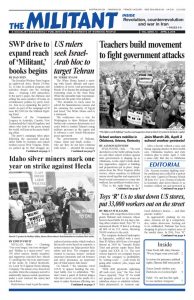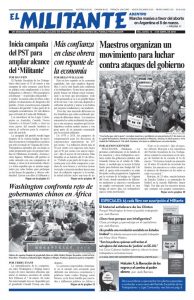More than 140 dairy farmers across eight states took another blow this month. As these farmers are now into the fourth year of low milk prices, Dean Foods, one of the country’s major processors, sent them a letter saying that the company will stop buying their milk May 31.
The letter, which was received by farmers in Indiana, Kentucky, Pennsylvania, Ohio, New York, North Carolina, South Carolina and Tennessee, gave them just 90 days’ notice before they’ll be cut off.
“It’s kind of dirty,” Sweetwater, Tennessee, farmer Caleb Watson told USA Today March 13, commenting on the way Dean Foods is treating him. “Ninety days ain’t much for a dairy farmer to make a decision like this.”
Dean Foods says that increased national milk production, decreased demand and competition from a new Walmart milk-processing plant in Indiana are the reasons they are cutting back on purchases. The company intends to rely on fewer but larger farm businesses with bigger herds that produce more and charge less.
After a milk shortage in 2014 led to higher prices, many dairy farmers plowed money into expanding their herds and production, increasing their debt. This created a glut and led to massive milk dumping by farmers in 2016 — 43 million gallons — and financial ruin for many.
Prices have remained depressed, falling below farmers’ cost of production for more than three years.
“We’re trying to weather the storm, but the storm just got a little rougher,” Joe Kelsay, a dairy farmer in Indiana cut off by Dean, told the Progressive Dairyman.
As milk prices contracted, several major retailers moved to cut out middlemen like Dean. Kroger Co. — the largest U.S. supermarket chain — and Albertsons both put hundreds of millions of dollars into opening their own in-house milk processing plants. And now Walmart, which competes with just about everybody for just about everything and is the largest seller of groceries in the U.S., is doing the same.
Farmers dropped by Dean Foods are trying to find other processors to take their milk, but without much success.
Cathy Heim of Stoneboro, Pennsylvania, a sixth-generation dairy farmer, told the Militant none of the processors in her area are interested.
Heim said many people told her she needed to “get bigger.” “But to get bigger you have to have money,” she said, adding that if she had done so, she would now not only have to sell out, but she’d have a huge debt.
Dean’s letter included a number to call. Heim, who drives a school van when not working on the farm, phoned. “Are we going to get severance pay? Unemployment?” she asked Dean. “Are you going to send my husband to school to get retrained?”
Heim sees this crisis as very different from ones in the past. She has told neighbor dairy farmers who sell to other companies that “you’re next.” She told farmers still under contract that “there are going to be no small farms left.”
In the past there were government buyout plans to help dairy farmers when there was an overabundance of milk. But these have all been eliminated. “The government doesn’t care about us,” said Heim.
The low prices are bringing dairy farmers together to talk about alternatives to the present pricing system in the U.S. The Wisconsin Farmers Union recently organized meetings to hear farmers from Canada in five Wisconsin towns. The Canadians explained how the quota system there guarantees farmers a price for their milk that covers the cost of production, plus a surplus that ensures farmers a living.
As part of the discussion, Randy Jasper, a part-time grain farmer and former dairy farmer, said that there is no milk surplus problem. “There are people in the U.S. who need the milk. There are hungry people in the United States,” he said.
“We should do what the farmers of Cuba would do — work together to produce for the country and donate the surplus to people who need it in the U.S. and around the world.”

